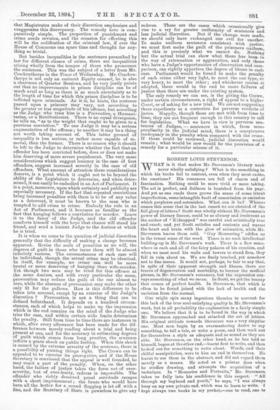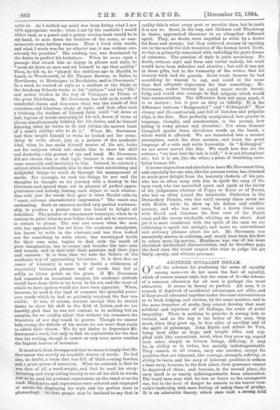ROBERT LOUIS STEVENSON.
WHIT is it that makes Mr. Stevenson's literary work never wholly satisfying ? What is the something in which his books fail to content, even when they most excite, the emotions ? His romances are full of charm and of fascination. Nothing could be more vivid or more taking. The art is perfect, and dullness is banished from his page. And yet as one reads there grows the sense of some latent imperfection, some intangible fault of commission or omission which perplexes and astonishes. What can it be? Whence comes this sense that in the last resort we are cheated of the full glory of letters? Scott was wholly without Mr. Stevenson:a power of literary finesse, could be as clumsy and irrelevant as the author of "Kidnapped" was careful and artistically true and exact; and yet Scott satisfies and contents and warms the heart and brain with the glow of animation, while Mr. Stevenson leaves them cold. "Guy Mannering " edifies us in the truest sense of the word. There is no such intellectual building-up in Mr. Stevenson's work. There is a flaw some- where in each and all of the fairy palaces of his creation, and when we most need his walls and towers to stand firm, they fall in ruin about us. We are finely touched, yet somehow not to fine issues. It would not, perhaps, be fair to say that, in spite of their apparent strength and fitness, there are traces of degeneration and morbidity, to borrow the medical phrase, in Mr. Stevenson's romances, but the expression con- veys something of what we mean. In Scott, we get the beauty that comes of perfect health. In Stevenson, that which is often to be found joined with the lack of health and the variation from the normal.
One might spin many ingenious theories to account for this lack of the true soul-satisfying quality in Mr. Stevenson's work, but in all probability the explanation is a fairly simple one. We believe that it is to be found in the way in which Mr Stevenson approached and attacked the art of letters. His original attitude towards literature was a very singulaa• one. Most men begin by an overmastering desire to say something, to tell a tale, or write a poem, and then work out for themselves a style as adequate and as sound as they are able. Mr. Stevenson, on the other hand, as he has told nn himself, began at the other end,—learnt first to write, and then looked out for something to write about. Words, and their skilful manipulation, were to him an end in themselves. He learnt to use them in the abstract, and did not regard them merely as a means. He acted as a painter does when he studies drawing, and attempts the acquisition of a technique. In "Memories and Portraits," Mr. Stevenson takes us fully into his confidence in this respect. "AU through my boyhood and youth," he says, "I was always busy on my own private end, which was to learn to write. I kept always two books in my pocket,—one to read, one to write in. As I walked my mind was busy fitting what I saw with appropriate words ; when. I sat by the roadside I would either read, or a pencil and a penny version-book would be in my hand, to note down the features of the scone, or com- memorate some halting stanzas. Thus I lived with words, and what I wrote was for no ulterior use, it was written con- sciously for practice." His reading, too, was dominated by the desire to perfect his technique. When he came upon a passage that struck him as happy in phrase and style, he "must sit down at once and set himself to ape that quality." Thus, he tell us, he "played the sedulous ape to Hazlitt, to Lamb, to Wordsworth, to Sir Thomas Browne, to Defoe, to Hawthorne, to Montaigne, to Baudelaire, and to Ohermann." In a word, he worked at style as a student at the Slade or the Academy Schools works at his " antique " and his "life," and makes studies in the way of Velasquez or Titian, or the great Dutchmen. Mr. Stevenson has told us in words of wonderful charm and eloquence what was the result of this conscious and laborious study of style ; and how, after such a training, the student of literary form could "sit down at last, legions of words swarming to his call, dozen of turns of phrase simultaneously bidding for his choice, and he himself knowing what he wants to do and (within the narrow limit of a man's ability) able to do it." When. Mr. Stevenson had thus taught himself to write he looked out for some- thing to write about, just as a painter of the academic kind, when he has made himself master of his art, looks out for subjects which will enable him to show his skill and dexterity,—his powers of eye and hand. Mr. Stevenson did not choose this or that topic because it was one which came naturally and inevitably to him. Instead, he selected a subject which would enable him to show what astonishing and delightful things he could do through his management of words. For example, he took the things he saw and the thoughts he thought on his journey with a donkey in the Cevennes and spread them out in phrases of perfect appro- priateness and melody, linking each object or each abstrac- tion with just the words that gave it what Hazlitt calls its "exact, extreme, characteristic impression." The result was enchanting. Such an oecasion needed only perfect workman- ship to produce a picture that was bound to delight all beholders. The painter of consummate technique, when he is content to paint what he sees before him and not to construct, is certain to please. The real test comes when the man who has approached his art from the academic standpoint, has learnt to write in the abstract, and has then looked out for something to write about, has worshipped words for their own sake, begins to deal with the world of pure imagination, has to create and breathe life into men and women, and to deal with their passions and their joys and sorrows. It is then that we note the failure of the academic way of approaching literature. It is then that an ounce of humanity is seen to he worth a wilderness of exquisitely balanced phrases and of words that fall as softly as blown petals on the grass. If Mr. Stevenson had remained an occasional essayist, his academic attitude would have done little or no harm to his art, and the want of which we have spoken would not have been apparent. When, however, he used in the land of romance the splendid power over words which he had so patiently acquired, the flaw was visible. It was, of course, natural enough that he should desire to show his skill in the field of fiction, and we are heartily glad that he was not content to be nothing but an essayist, for we readily admit that without his romances the literature of our day would be poorer. Though we cannot help seeing the defects of his novels we are more than ready to admit their charm. We do not desire to depreciate Mr. Stevenson's work, but only to find an explanation for the fact that his writing, though it comes so very near, never reaches the highest heaven of invention.
It must not, then, be supposed that we mean to imply that Mr. Stevenson was merely an exquisite weaver of words. He had also, no doubt, a brain that was full of thick-coming fancies, and a great power of narration. What we contend, is that he was first of all a word-wright, and that he used his story- inventing and story-telling faculty to set off his skill in words, just as he used his personal experiences on the canal or on the road. His fancies and experiences were selected and employed as means for displaying his style and his perfect taste in phraseology. At first, people may be inclined to say that in
reality this is what every poet or novelist does, but in truth it is not so. Scott, in his way, and Dickens and Thackeray in theirs, approached literature in an altogether different spirit. They, no doubt, were impelled to write by a desire for fame and money; but they achieved success by opening out to the world the rich treasures of the human heart. Scott, we feel, is primarily concerned with unfolding the great drama of existence. The question of style is quite secondary. No doubt, without style and form and verbal melody, his work would have been defective and abortive ; but still it was not in these gifts, but in the humanity of the writer, that his literary work had its genesis. Scott wrote because he had something he wanted to say, and could at the same time find adequate expression for that something ; Mr. Stevenson, rather because he could weave words beauti- f ally, and could also manage to find subjects which would bear ornamentation. The difference does not seem much, it is so narrow; but it goes as deep as infinity. It is the difference between "Redgauntlet " and "Kidnapped." How clumsy and ill-constructed, and full of blotches and palpable slips, is the first. How perfectly manipulated, how precise in language, thought, and construction, is the second, how telling is evcry phrase and situation ! Yet when General Campbell speaks those chivalrous words on the beach, a whole world is affected. We are translated into a serener atmosphere, catch the clear accents, and learn the great language of a wide and noble humanity. In "Kidnapped" we are never moved like this. We mark how fine are the colours ; "we hear how the tale is told ; " it is art, triumphant art ; but it is not, like the other, a piece of breathing satis- fying human life.
It seems ungracious and churlish to leave Mr. Stevenson thus, and especially for one who, like the present writer, has obtained so much pure delight from the heavenly rhetoric of his pen, who has so often sung with him in spirit the song of the open road, who has marvelled again and again at the nicety of his judgments, whether of Pepys or Knox or of Burns, who has so often joined the inimitable Pinkerton in the Dromedary Picnics, who has until seventy times seven sat with Morris while he drew up his debtor and creditor account, and who has not once, but a dozen times seen with David and Catriona the first view of the Dutch coast and the merry windmills whirling on the shore. And yet it is most consistent with the spirit of the man we are criticising to speak out straight, and make no conventional and obituary phrases about his art. Mr. Stevenson was essentially sincere in criticism, and would have been the first to refuse mere lip-service. Manliness was one of his most cherished intellectual characteristics, and he therefore pays the dead man the truest respect who tries to judge his art fairly, openly, and without pretence.


































 Previous page
Previous page